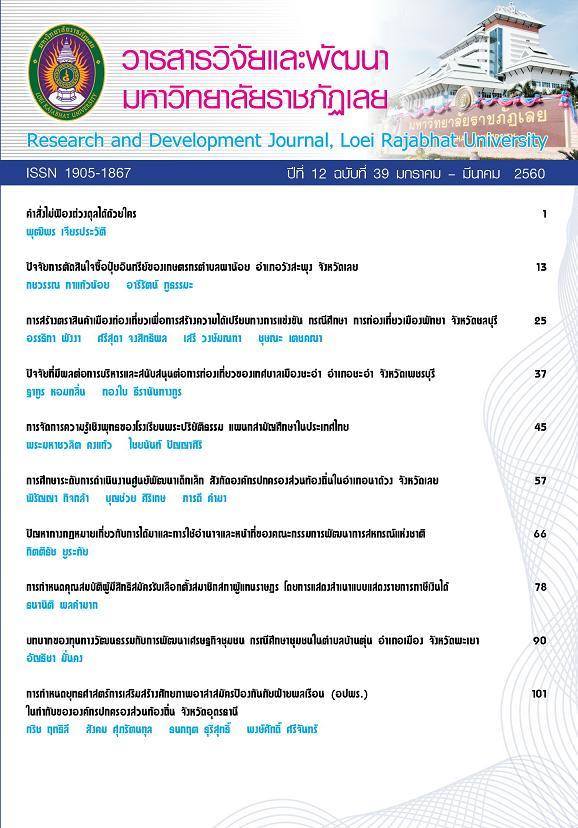การจัดการความรู้เชิงพุทธของโรงเรียนพระปริยัติธรรม แผนกสามัญศึกษาในประเทศไทย
Keywords:
การจัดการ, ความรู้เชิงพุทธ, โรงเรียนพระปริยัติสามัญ, แผนกสามัญศึกษา, management, Buddhist knowledge, Phra Pariyatti Dhamma school, general educationAbstract
บทคัดย่อ
การวิจัยครั้งนี้มีวัตถุประสงค์เพื่อศึกษาปัจจัยสนับสนุนความสำเร็จการจัดการความรู้เชิงพุทธและกำหนดแนวทางการจัดการความรู้เชิงพุทธของโรงเรียนพระปริยัติธรรม แผนกสามัญศึกษา วิธีการศึกษาโดยการสัมภาษณ์ เชิงลึกกับผู้ให้ข้อมูลสำคัญ จำนวน 13 รูป/คน โดยแบ่งออกเป็น 4 ภูมิภาคๆ ละ 1 โรงเรียน แล้วนำมาวิเคราะห์เนื้อหา
ผลการวิจัยพบว่า ทั้ง 4 โรงเรียน มีปัจจัยสนับสนุนการจัดการความรู้ระดับบุคคลคือ ผู้บริหารโรงเรียนคำนึงถึงความแตกต่างและหลากหลายของนักเรียน กระตุ้นเตือนให้ครูแสวงหาความรู้เพื่อพัฒนาตนเอง ผู้บริหารและครูมีความเป็นกัลยาณมิตร คอยแนะนำ ช่วยเหลือและเข้าใจนักเรียน การนำหลักวุฑฒิธรรมตามขั้นตอนการเรียนรู้วิถีพุทธมาประยุกต์ใช้ในการเรียนการสอน ส่วนปัจจัยสนับสนุนการจัดการความรู้ระดับองค์กรคือ มีการใช้เทคโนโลยีสารสนเทศเข้ามามีบทบาทในการสื่อสาร ใช้งานร่วมกัน และจัดเก็บความรู้เพื่อเพิ่มประสิทธิภาพการทำงาน มีการใช้หลักสาราณียธรรม คือมีความปรารถนาดีต่อกันทางกาย วาจาและใจ เคารพความคิดเห็นที่แตกต่าง ไม่หวงความรู้ และมีการปฏิบัติตามหลักอปริหานิยธรรม ในการประชุมปรึกษาหารือ ปฏิบัติตามกฎระเบียบ พร้อมทั้งเคารพและส่งเสริมบุคคลมีความรู้ให้อยู่กับองค์กร ส่วนการกำหนดแนวทางการจัดการความรู้เชิงพุทธ โรงเรียนได้อาศัยกระบวนการจัดการความรู้ที่ประกอบไปด้วย การกำหนดความรู้ การแสวงหาความรู้ การแลกเปลี่ยนความรู้ การจัดเก็บความรู้ การเผยแพร่ความรู้ และการประยุกต์ใช้ความรู้โดยยึดโยงอยู่กับความรู้ที่อิงหลักการพระพุทธศาสนา กลุ่มสาระการเรียนรู้ 8 กลุ่ม และสอดคล้องกับวิถีวัฒนธรรมท้องถิ่น และมีปัจจัยสนับสนุนการจัดการความรู้ระดับบุคคลและองค์กรเพื่อขับเคลื่อนไปสู่โรงเรียนปฏิบัติที่ดีเลิศ
Abstract
This research aimed to study supporting factors to success for Buddhist Knowledge Management and guidelines to management Buddhist Knowledge of Phra Pariyatti Dhamma General Education Schools. The Method is based on In-depth interviews with key informant of 13 people. The study was divided into four regions with one representative per school to be interviewed. The data were then analyzed.
The results showed that all four schools have supporting factors in knowledge management at individual level. The executives were taken into account of the differences and variety of students. They motivated a teachers to Seek knowledge for self-improvement. Executives and teachers are grateful, guiding and understanding. They used the Wutthydhamma rule according to these steps in Buddhism learning to applied in the course. For the factors supporting knowledge management in the organization, the information technologies play a role in communication. Sharing and storing knowledge increased working performance by using Saraniyadhamma rules. The Saraniyadhamma rules are praising each other, respect different opinions, sharing of knowledge and compliance with the Apparihaniyatidham rules when having a meeting, respect the rules and keeping knowledgeable persons within the organization. For the definition of Buddhist knowledge management, the schools rely on knowledge management processes such as defining knowledge, seeking knowledge, exchange of knowledge, knowledge storage, dissemination of knowledge and the application of knowledge based on the principles of Buddhism and 8 groups of learning in accordance with the local culture and the factors supporting the management of personal and organizational knowledge to drive the excellent practices.
Downloads
How to Cite
Issue
Section
License
ข้อความที่ปรากฎในวารสารฉบับนี้เป็นความคิดเห็นของผู้เขียนแต่ละท่าน สถาบันวิจัยและพัฒนา มหาวิทยาลัยราชภัฏเลย และกองบรรณาธิการ ไม่จำเป็นต้องเห็นด้วยและไม่มีส่วนรับผิดชอบใดๆ
สถาบันวิจัยและพัฒนา มหาวิทยาลัยราชภัฏเลย ขอให้ผู้อ่านอ้างอิงในกรณีที่ท่านคัดลอกเนื้อหาบทความในวารสารฉบับนี้






